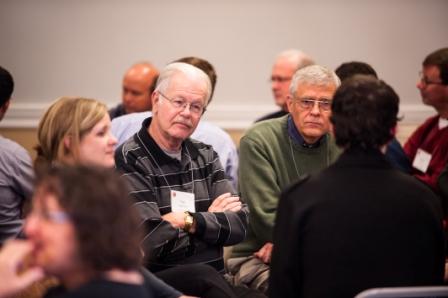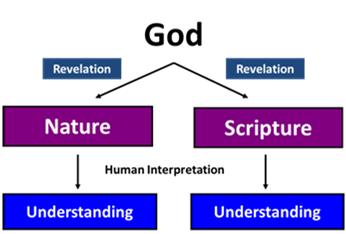
Today’s post begins a series about the relationship between science and Christian faith. I want to begin by addressing why I’m interested in this topic. I became a Christian in the middle of my academic career as a biology professor at Iowa State University. As I was coming to faith and afterwards I felt tension between my new faith and my knowledge of science. Was it really possible to believe in God in a modern scientific world?
I believe that the Bible is God’s word, it is inerrant in the original manuscripts and it is infallible (because of the character of God). But I was challenged by the early chapters of Genesis. How could I reconcile the Bible’s description of creation with scientific findings about the natural history of life and the universe?
I began to do some reading in this area. I read people like Ian Barbour, John Haught, John Polkinghorne, Ken Miller, Francis Collins and Alister McGrath among others. I discovered that there is no necessary conflict between science and Christian belief. As I was doing this reading, I realized that this is an important issue that troubles many students. It’s a challenge to the faith of believers and can be a serious roadblock for seekers. I began to think about developing a course on the subject. But because I was not trained as a theologian, I felt that I would not be allowed to teach such course in a regular academic department.
Then God gave me the opportunity to serve for one semester on my college’s honors committee. There I found out about honors seminars. These are one credit interdisciplinary courses that are meant to broaden the experience of honor students. Every student is required to take two of these during the course of their studies. The honors program likes to have professors teach courses that combine their academic expertise with a “hobby” interest.
In my case I was able to combine my academic expertise in Biology with my interest in Christian theology (my hobby interest). I developed a proposal for a course that I called God and Science and much to my amazement it was approved. I began teaching the course in the fall of 2000 and have been teaching it now for 13 years. Over the years the course has evolved as I learn more and more about the subject through my reading. It is now called Christianity and Science.
Below is an outline of the course. It is taught in a half-semester format in which the class meets for two hours once a week for 8 weeks.
Week 1 – Nature and Limitations of Science
Week 2 – Origin and History of Life on Earth – Timing of Events
Week 3 – Origin and history of life on earth – Mechanism
Week 4 – Origin and history of life on earth – Human origins
Week 5 – Does God have a place as an explanation in science? The case of Intelligent Design
Week 6 – What does science have to say about the existence of God?
Week 7 – Does science have a place in theology? The case of natural theology.
Week 8 – Discussion of final journal reflections and course wrap-up.
In this series of blogs, I’m going to highlight some of the main insights that I have gained from teaching this course. In particular I’m going to address two main issues. Can we reconcile the Bible’s account of creation in Genesis with the scientific account of natural history? Is belief in God as the Creator compatible with the scientific theory of evolution?
There are two main points of tension between the scientific account of natural history and the creation account in Genesis 1. One is the timing of the creation events and the other is the mechanism of creation. Science indicates that the earth and the universe are billions of years old whereas Genesis speaks of creation events occurring over a period of six days. With respect to mechanism, science indicates that the universe came into existence and then evolved through a natural process over the next 13 .7 billion years giving rise to the earth (4.5 billion years ago) and life (3.5 billion years ago). In contrast Genesis 1 seems to speak about a series of miraculous creation events occurring over a period of six days.

Before we get into the specifics, I want to share some general thoughts about how to deal with tension between science and the Bible. The Bible teaches that God reveals himself to man in two ways. One is through the Bible (special revelation) and the other is through what we observe in nature (general revelation). This is perhaps best seen in Psalm 19 written by King David. Verses 1-6 speak about God’s revelation in nature. In verse 1 David proclaims:
The heavens declare the glory of God; the skies proclaim the works of his hands.
Verses 7-11 speak about the virtues of God’s revelation in Scripture. For example verse 7 states:
The law of the LORD is perfect, reviving the soul. The statutes of the LORD are trustworthy, making wise the simple.
God’s revelation in nature is also explicitly expressed in Romans 1:20 where Paul states that God’s eternal power and his divine nature are revealed in God’s creation (nature). This verse also adds a moral dimension in that man is accountable for receiving the knowledge of God available through nature.
My first conclusion is that there can be no real conflict between God’s revelation in nature and God’s revelation in Scripture. Because of God’s character, his infinite wisdom and his righteousness, what God reveals in nature and what God reveals in Scripture must both be true.
But human understanding of these revelations requires human interpretation and that is fallible for two reasons. First, man’s wisdom and understanding is greatly inferior to God’s.
For my thoughts are not your thoughts, neither are your ways my ways, declares the Lord. For as the heavens are higher than the earth, so are my ways higher than your ways and my thoughts and your thoughts (Isaiah 55:8-9).
The second reason is the fall which corrupts man’s ability to reason and understand. For example Paul states in Romans 1:21-23:
For although they knew God, they neither glorified him as God nor gave thanks to him, but their thinking became futile and their foolish hearts were darkened. Although they claimed to be wise, they became fools and exchanged the glory of the immortal God for images made to look like a mortal human being and birds and animals and reptiles.
And again in 1 Corinthians 1:20 he said:
Where is the wise person? Where is the teacher of the law? Where is the philosopher of this age? Has not God made foolish the wisdom of the world?
Thus my second conclusion is that any apparent conflict between God’s revelations in nature and Scripture must be due to faulty interpretation of one or both revelations. As we consider the tension between the scientific and scriptural accounts of creation we may be able to resolve some of the apparent conflicts but we also have to live with some of the tension trusting in God and his character.
Next in the Christianity and Science series. In The Message of Genesis 1 we talk about the message of Genesis 1 and how the controversy over the timing and mechanism of creation often overshadows this message.
Questions for further reflection:
- What are your initial thoughts about the interaction of science and Christianity?
- What questions do you have about this subject?
- What tensions does the topic of Christianity and science bring up for you?
- How do you view the Bible? Do you see it as the word of God or do you see it as man’s reflection on the divine?

- The Language of God: A Scientist Presents Evidence for Belief, Francis S. Collins. Free Press, 2007.
- Science & Religion: A New Introduction, 2nd Edition, Alister E. McGrath. Wiley-Blackwell, 2010.
- Finding Darwin’s God: A Scientist’s Search for Common Ground between God and Evolution, Kenneth R. Miller. Harper Collins, 2007.
- Added by the editor: PDF with the titles and links to the posts in Tom Ingebritsen‘s Christianity and Science series. Yes, this was created to meet the requests of readers and will be updated. Your interest in and encouragement of this series is much appreciated.
Notes added by the editor:
- Dr. Francis Collins is a physician and geneticist known for spearheading the Human Genome Project and for his landmark discoveries of disease genes. With Collins at the helm, the Human Genome Project produced a finished sequence of human DNA in 2003. He then used this new data to help create powerful tools and strategies to advance biological knowledge about humans and improve their health. Along with his research, Collins has also stressed the importance of considering the ethical and legal issues surrounding genetics.Formerly an atheist, Collins became a Christian in his 20’s after realizing his perspective did not provide answers to profound questions about the meaning of life and was inconsistent with observations about the nature of the universe and humankind. He wrote about finding harmony between the scientific and spiritual worldviews in The Language of God: A Scientist Presents Evidence for Belief, which spent 20 weeks on The New York Times bestseller list. . . . Collins received a Bachelor of Science from the University of Virginia, a doctorate in physical chemistry from Yale University and a medical degree from The University of North Carolina. He was elected to the Institute of Medicine and the National Academy of Sciences, and in November 2007 was awarded the Presidential Medal of Freedom, the highest civilian honor given by the president, for revolutionizing genetic research. This bio was drawn from material posted at BioLogos. For a Veritas Forum presentation by Francis Collins click here.↩
Tom Ingebritsen is an Associate Professor Emeritus in the Dept. of Genetics, Development and Cell Biology at Iowa State University. Since retiring from Iowa State in 2010 he has served as a Campus Staff Member with InterVarsity Graduate & Faculty Ministry at Iowa State University

Nice post, Tom! I agree with you fully. Are you happy with your Christianity and Science course as it now stands, or do you have ideas for new directions you’d like it to take in the future?
Dave- I don’t have any plans for major changes in the course but each year I update the course based on new developments from my reading in the area.
That sounds like a fascinating course! My college is currently hosting the Pensmore Dialogues on Science and Faith, where a number of similar topics will be discussed. For further information, here’s the website: http://www.phc.edu/science&faith.php (more information will be forthcoming as the conference draws nearer).
Your conference looks very interesting. I use some material from John Lennox’s book God’s Undertaker in my course. When is the conference scheduled? Is there an option to participate online?
I’m not certain whether PHC will be webcasting this year (though the college has in the past); the best person to ask would be David Halbrook, the manager of the Communications department at the college. His email address is officeofcommunications (at) phc (dot) edu. You can also search Youtube, as I believe the recorded sessions from last year’s conference are online.
Thanks for your interest!
Sorry, wrong web link. The correct one is http://www.pensmoredialogue.com.
I am looking forward to following these posts. I’d be curious of what you think of John Walton’s view of origin and function and the purpose of Gen 1-2.
I’m familiar with John Walton’s work. I will be dealing with that in an upcoming blog.
Tom, I’m really looking forward to reading this series. Thanks so much for taking the time to edit these themes down for us! I’m curious about your views on the rising understanding of Lamarckism.
Is it possible some part of the conflict exist due to the difference in how people view God? If God, to any one individual, is merely a smarter human being or an advanced alien or worse yet a force of nature it might limit their ability to accept the revelation of power related in Genesis. The form of creation gifted to human beings requires the systematic development of structure from more elemental components. A building up process. We might logically extend that process to God. Even for Christians the revelation of God’s true nature takes time. Most Christians don’t realize just how smart God really is. It would be my contention that He literally created knowledge including all processes of knowledge associated with discovery and that He gave them to us to learn to use. He Himself is greater than the aggregate some of all knowledge of the universe.